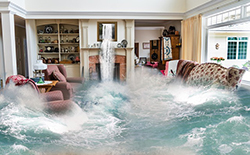 If you’ve been working with your hands for any length of time, then you know that the difference between a professional job and a DIY project isn’t binary, it’s a spectrum. On one end, you’re taking your team out to build a house on a client’s property, and on the other end, you’re building a birdhouse in your garage just because it seemed like a fun way to kill an afternoon. In the middle, you’ve got storage sheds, home repairs, additional rooms, doghouses and so on. At some point along that spectrum, insuring your project becomes a necessity, either for legal or pragmatic reasons. But where exactly is that point? What kind of DIY projects do you need to get insured, and which ones can you afford to not worry about?
If you’ve been working with your hands for any length of time, then you know that the difference between a professional job and a DIY project isn’t binary, it’s a spectrum. On one end, you’re taking your team out to build a house on a client’s property, and on the other end, you’re building a birdhouse in your garage just because it seemed like a fun way to kill an afternoon. In the middle, you’ve got storage sheds, home repairs, additional rooms, doghouses and so on. At some point along that spectrum, insuring your project becomes a necessity, either for legal or pragmatic reasons. But where exactly is that point? What kind of DIY projects do you need to get insured, and which ones can you afford to not worry about?
You have a few main concerns, here:
-
- Are you investing more than you can afford to lose?
-
- Is liability a concern?
-
- Will this affect any existing insurance policies you hold?
Take, for instance, building an additional room onto your home. This is going to have an effect on your existing homeowner’s policy, and if you don’t inform your insurer about your project, you may wind up invalidating that policy altogether.
On the other hand, spending a weekend erecting a doghouse in your backyard probably won’t affect your homeowner’s policy at all, and you’re probably not spending more than a hundred dollars on lumber and other materials. You may even be piecing it together from scrap wood left over from another project. The only concern here is liability, which might or might not be covered by your current homeowner’s policy. To play it safe you can always build a doghouse in the garage and wheel it out to the yard on a dolly to make sure you don’t wind up with barbecue guests stepping on a nail or something, but it’s generally worth checking your policy before starting any such project, just to be sure.
There are projects that may be covered by your homeowner’s policy in terms of liability, but wind up costing a little more than piecing a doghouse together out of scrap lumber. A shed, for instance, or costly home improvements. In these instances it’s down to peace of mind. Are you comfortable working without insurance, or would you like to have a safety net just in case?
If you’re bringing other people onto a project, then of course you’re probably going to want some basic liability coverage, but for more DIY projects than not, the rule of thumb is not to worry about insurance unless you feel uncomfortable without it, it’s required by law as with larger structures like guest homes, or it’s affecting a policy you already hold.


 Insurance companies shelled out $479 million to pay for dog bites last year, up from $413 million in 2010.
Insurance companies shelled out $479 million to pay for dog bites last year, up from $413 million in 2010. Credit card companies, lenders, landlords and even prospective employers use credit scores to determine an individual’s level of financial responsibility. Credit scores are supposed to be snapshots of a person’s credit history. They are determined by Fair, Isaac & Co., which is commonly referred to as FICO. When individuals have low scores, their credit applications are usually denied. In some cases, a score that is low but not too low for approval will result in a high interest rate. Many lenders use a person’s credit score to set the loan cost. It is important for everyone to understand how credit scores are calculated.
Credit card companies, lenders, landlords and even prospective employers use credit scores to determine an individual’s level of financial responsibility. Credit scores are supposed to be snapshots of a person’s credit history. They are determined by Fair, Isaac & Co., which is commonly referred to as FICO. When individuals have low scores, their credit applications are usually denied. In some cases, a score that is low but not too low for approval will result in a high interest rate. Many lenders use a person’s credit score to set the loan cost. It is important for everyone to understand how credit scores are calculated. Senior citizens make up the group most affected by stress-related psychological and medical conditions. For such issues, yoga might offer great relief. Recent research shows that it is effective in treating people who suffer from high blood pressure, depression, anxiety and cardiovascular disease. The theory that researchers have might help develop mind-body practices as preventative treatments for such conditions, which are helpful when used with standard treatments.
Senior citizens make up the group most affected by stress-related psychological and medical conditions. For such issues, yoga might offer great relief. Recent research shows that it is effective in treating people who suffer from high blood pressure, depression, anxiety and cardiovascular disease. The theory that researchers have might help develop mind-body practices as preventative treatments for such conditions, which are helpful when used with standard treatments. Last month, the President signed a bill extending the National Flood Insurance Program (NFIP) for five years. This means that millions of Americans will be able to protect themselves against a risk that can cost the nation billions a year in property damage.
Last month, the President signed a bill extending the National Flood Insurance Program (NFIP) for five years. This means that millions of Americans will be able to protect themselves against a risk that can cost the nation billions a year in property damage. It’s your turn to host the family holiday meal, and you’re prepared with the menu, table decorations and updated homeowners insurance. Is your kitchen safe? Consider 10 kitchen safety tips for your holiday meal.
It’s your turn to host the family holiday meal, and you’re prepared with the menu, table decorations and updated homeowners insurance. Is your kitchen safe? Consider 10 kitchen safety tips for your holiday meal. At the end of the year, many companies encourage employees to take accrued vacation time. While you may be tempted to forfeit your earned days off, vacations are important for nine reasons.
At the end of the year, many companies encourage employees to take accrued vacation time. While you may be tempted to forfeit your earned days off, vacations are important for nine reasons. After a severe hail storm or vehicle accident, your insurance company totals your car. The settlement amount they offer is fairly low, though. Use seven tips to negotiate your auto insurance claim.
After a severe hail storm or vehicle accident, your insurance company totals your car. The settlement amount they offer is fairly low, though. Use seven tips to negotiate your auto insurance claim. Severe weather can strike at any time of the year. It is not always possible to avoid driving during dangerous weather conditions. However, being a cautious driver can mean the difference between getting home safely and standing along the side of the road waiting for a tow truck.
Severe weather can strike at any time of the year. It is not always possible to avoid driving during dangerous weather conditions. However, being a cautious driver can mean the difference between getting home safely and standing along the side of the road waiting for a tow truck.



